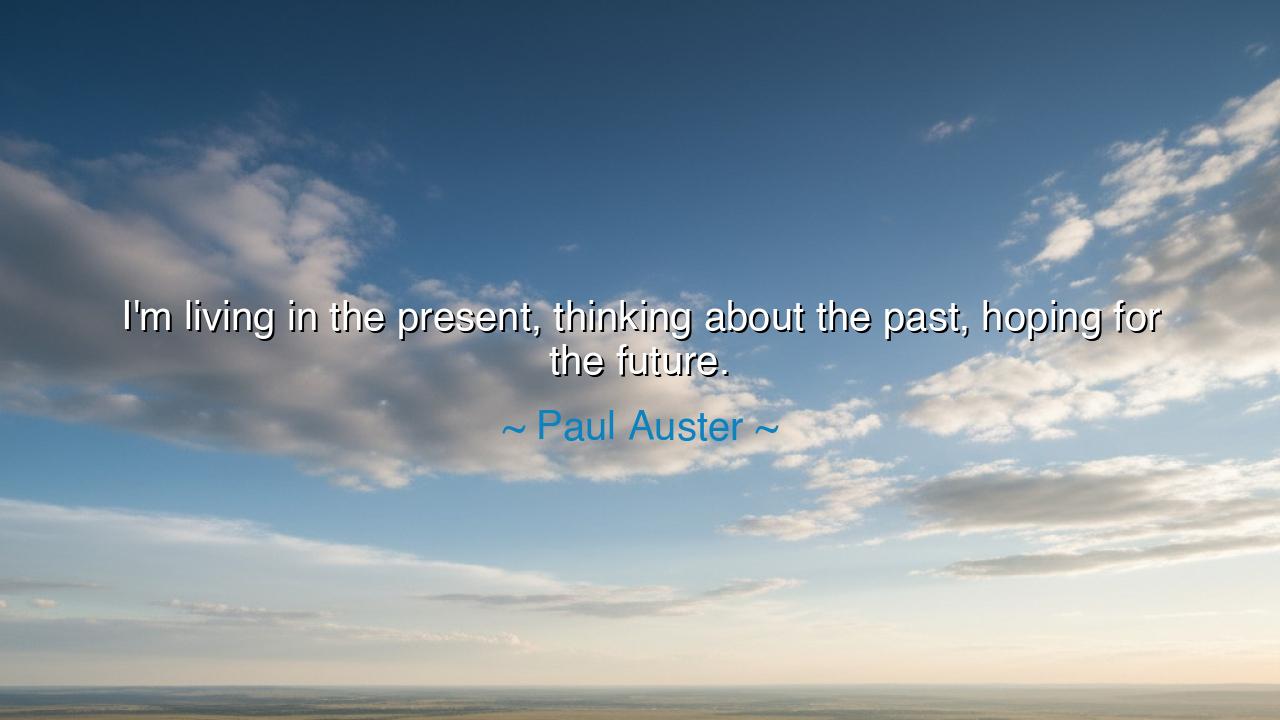
I'm living in the present, thinking about the past, hoping for






In the ebb and flow of life, the present moment, fleeting as it is, often feels like a delicate balance between what has been and what is yet to come. Paul Auster, in his reflection, speaks to this delicate balance when he says, "I'm living in the present, thinking about the past, hoping for the future." These words capture the essence of what it means to be human: to experience life in real time while carrying with us the weight of the past and the hopes of the future. In these simple words, Auster encapsulates the human experience—a dance between memory and anticipation, between what has been learned and what has yet to unfold.
The ancients were no strangers to this tension. In Greek philosophy, the notion of time was a central theme. The philosopher Heraclitus spoke of the perpetual flow of time, stating that "You cannot step into the same river twice." This reflects the truth that the present is always in motion, and once it is past, it cannot be recaptured. Yet, Heraclitus also believed that while the present is fleeting, it is shaped by the past, and its trajectory is guided by our vision of the future. In this way, Auster’s words echo the Greek understanding of time as a cycle, where each moment connects the past, the present, and the future in an eternal dance.
Consider the story of Odysseus, the hero of Homer’s epic, the Odyssey. As he journeys home, he is constantly pulled between his memories of Ithaca—the life he left behind—and the uncertainties of the future. Yet, even as he longs to return to the past, he cannot deny the path that lies ahead. The Odyssey teaches us that the journey is not just a movement toward an end but a continual reckoning with the past and the future. Odysseus’s memories of home sustain him, but it is his actions in the present that shape his destiny. Just as Auster reflects on the present, past, and future, so too does Odysseus, who must live in the present moment while holding his hopes for a future reunion with his loved ones.
The ancient Romans too understood the weight of time. The Roman statesman Cicero wrote extensively on the nature of time, declaring that, "The greatest use of time is to plan for the future while living fully in the present." Cicero recognized the importance of balancing the past, which offered wisdom, with the future, which offered possibility, while also urging individuals to live purposefully in the now. For the Romans, the true measure of a life well-lived was not in how one dwelled on past glories or future fears, but in how one acted with integrity and resolve in the present moment.
In modern times, the struggle between the present, the past, and the future remains just as relevant. The great leaders of history have often been those who were able to draw strength from their past, hope from the future, and yet maintain a keen focus on the present. Take, for example, Winston Churchill during the dark days of World War II. Churchill’s speeches were filled with reflections on the past—the sacrifices made during the First World War—and his hopes for a future free from tyranny. But it was his ability to act decisively in the present, to lead his people in the moment of crisis, that ultimately secured victory. His life exemplifies the truth that while the past informs us and the future inspires us, it is our actions in the present that determine the course of our lives.
The lesson in Auster’s words is one of balance—the understanding that while we cannot change the past, and the future remains uncertain, we must live fully in the present. Every moment is an opportunity to shape the future through the decisions we make, grounded in the lessons we have learned. The past is a teacher, and the future is a promise, but only the present is real. In the same way that Odysseus must face his trials in the now while holding onto the memory of his home and the hope of his future return, we too must act with purpose and clarity today, knowing that the future will unfold from the choices we make in this very moment.
In our own lives, we must strive to live with awareness of the present while respecting the lessons of the past and remaining open to the possibilities of the future. Let us not become prisoners of our memories or slaves to the uncertainty of what is to come, but instead, let us find strength in the present, using it as the foundation upon which we build our future. Like Auster, we should be mindful of how the past and future shape our experiences, but we must not forget that the power to shape our destiny lies in how we live right now. Every action we take in the present moment ripples through time, crafting the life we wish to live and the future we wish to create.






AAdministratorAdministrator
Welcome, honored guests. Please leave a comment, we will respond soon